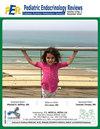For Debate: Programing of the Autoimmune Diabetogenic Response in the Thymus during Fetal and Perinatal Life.
4区 医学
Q2 Medicine
Pediatric endocrinology reviews : PER
Pub Date : 2019-12-01
DOI:10.17458/per.vol17.2019.gh.fd.autoimmunediabetogenicthymus
引用次数: 2
Abstract
T he presentation of self-peptides in the thymus is responsible both for negative selection of selfreactive T cells emerging during stochastic TCR recombination in fetal life, as well as positive selection of self-specific regulatory thymic T (tTreg) cells during and after perinatal life. The combination of these two sequential processes programs central self-tolerance, a fundamental property of the adaptive immune system. A defect in intrathymic self-presentation, either genetic or acquired, is the earliest event in the pathogenesis of autoimmunity already during fetal development. This defect is necessary but not sufficient for the appearance of a classical autoimmune disease like type 1 diabetes (T1D). Environmental factors are required for activation of the diabetogenic autoimmune response that targets insulin-secreting β cells in pancreatic Langerhans’ islets. Based on epidemiological studies, viral infections have been suspected for a long time to be one of those environmental factors. In this Debate article, we present a series of experimental data that support the hypothesis that, following vertical transplacental transfer, viruses might infect the fetal thymus and disturb already in utero central self-tolerance orchestrated by this organ. “It is with logic that we prove but it is with intuition that we discover.” Henri Poincaré (1854-1912) Ref: Ped. Endocrinol. Rev. 2019;17(2):00-00 doi:辩论:胎儿和围产期胸腺自身免疫性糖尿病反应的编程。
胸腺中自我肽的呈现既负责胎儿生命中随机TCR重组过程中出现的自我反应性T细胞的负选择,也负责围产期和之后自我特异性调节性胸腺T (tTreg)细胞的正选择。这两个连续的过程的结合决定了自我耐受性,这是适应性免疫系统的基本特性。胸腺内自我表现的缺陷,无论是遗传的还是获得的,都是胎儿发育过程中自身免疫发病的最早事件。这种缺陷是典型的自身免疫性疾病如1型糖尿病(T1D)出现的必要条件,但不是充分条件。环境因素是激活糖尿病源性自身免疫反应所必需的,其目标是胰腺朗格汉斯胰岛中胰岛素分泌β细胞。根据流行病学研究,病毒感染长期以来一直被怀疑是这些环境因素之一。在这篇辩论文章中,我们提出了一系列的实验数据来支持这一假设,即在垂直胎盘移植后,病毒可能会感染胎儿胸腺,并干扰已经在子宫内由该器官协调的中央自我耐受性。“我们用逻辑来证明,但用直觉来发现。”亨利·庞加莱(1854-1912)性。Rev. 2019;17(2):00-00 doi:
本文章由计算机程序翻译,如有差异,请以英文原文为准。
求助全文
约1分钟内获得全文
求助全文
来源期刊

Pediatric endocrinology reviews : PER
Medicine-Endocrinology, Diabetes and Metabolism
自引率
0.00%
发文量
1
期刊介绍:
PEDIATRIC ENDOCRINOLOGY REVIEWS (PER) publishes scholarly review articles in all areas of clinical and experimental Endocrinology, Diabetes, Nutrition and Metabolism. PER is intended for practicing pediatricians, pediatric endocrinologists, pediatric diabetologists, pediatric gastroenterologists, neonatologists, pediatric gynecologists, nutritionists, sport physicians and pediatricians-in-training.
PER will also publish topics on specific subjects or as proceedings of scientific meetings in the above fields of interest. All articles, whether invited or direct contributions, are peer-reviewed. PER publishes correspondence, book reviews, a meeting calendar and meeting reports.
 求助内容:
求助内容: 应助结果提醒方式:
应助结果提醒方式:


